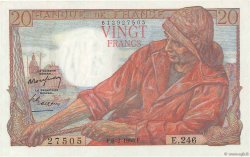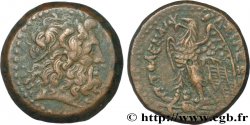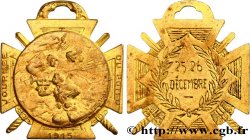Назад 1/1
fme_500769 - III REPUBLIC Médaille de récompense, Exposition Universelle Internationale
недоступный.
Товар уже продан в нашем интернет-магазине (2021)
Цена: : 130.00 €
Товар уже продан в нашем интернет-магазине (2021)
Цена: : 130.00 €
Тип Médaille de récompense, Exposition Universelle Internationale
Дата: 1900
Монетный двор / Город: 75 - Paris
Металл: bronze
Диаметр: 63,5 mm
Ориентация осей монеты: 12 h.
Гравер CHAPLAIN Jules-Clément (1839-1909)
Вес: 99,21 g.
Век: lisse + Corne BRONZE
Пуансон: corne BRONZE
Комментарии о состоянии
Patine hétérogène. Traces de frottement
Лицевая сторона
Аверс: легенда: RÉPUBLIQUE - FRANÇAISE.
Аверс: описание: Buste de Marianne drapée à droite, coiffée du bonnet phrygien décoré d'une branche de chêne ; un chêne au second plan et une ville avec un pond en arrière plan.
Обратная сторона
Реверс: легенда: EXPOSITION. UN - IVERSELLE. - INTERNATIONALE. / 1900 // COLAS.
Реверс: Описание: Un athlète portant la flamme, porté dans les airs par une victoire brandissant une couronne de lauriers ; Petit et Grand Palais en arrière plan. Signé : J. C. CHAPLAIN.
Комментарий
L'Exposition universelle de 1900 est la cinquième Exposition universelle organisée à Paris après celle de 1855, celle de 1867, celle de 1878 et celle de 1889.
Annoncée le 13 juillet 1892, elle est inaugurée le 14 avril par le président Émile Loubet, puis elle ouvre au public le 15 avril. Elle se termine le 12 novembre, après 212 jours d'ouverture. Elle accueille plus de 50 millions de visiteurs.
Manifestation emblématique de la Belle Époque, dont le thème est « Le bilan d’un siècle », elle lègue à Paris plusieurs bâtiments dont le Petit Palais et le Grand Palais..
The 1900 Universal Exhibition was the fifth World's Fair held in Paris after those of 1855, 1867, 1878, and 1889. Announced on July 13, 1892, it was inaugurated on April 14 by President Émile Loubet, and opened to the public on April 15. It ended on November 12, after 212 days of opening. It welcomed more than 50 million visitors. An emblematic event of the Belle Époque, whose theme was \\\"The Balance Sheet of a Century,\\\" it bequeathed several buildings to Paris, including the Petit Palais and the Grand Palais.
Annoncée le 13 juillet 1892, elle est inaugurée le 14 avril par le président Émile Loubet, puis elle ouvre au public le 15 avril. Elle se termine le 12 novembre, après 212 jours d'ouverture. Elle accueille plus de 50 millions de visiteurs.
Manifestation emblématique de la Belle Époque, dont le thème est « Le bilan d’un siècle », elle lègue à Paris plusieurs bâtiments dont le Petit Palais et le Grand Palais..
The 1900 Universal Exhibition was the fifth World's Fair held in Paris after those of 1855, 1867, 1878, and 1889. Announced on July 13, 1892, it was inaugurated on April 14 by President Émile Loubet, and opened to the public on April 15. It ended on November 12, after 212 days of opening. It welcomed more than 50 million visitors. An emblematic event of the Belle Époque, whose theme was \\\"The Balance Sheet of a Century,\\\" it bequeathed several buildings to Paris, including the Petit Palais and the Grand Palais.








 Cообщить об ошибке
Cообщить об ошибке Распечатать страницу
Распечатать страницу Отправить мой выбор
Отправить мой выбор Задать вопрос
Задать вопрос Consign / sell
Consign / sell
 Информация
Информация















